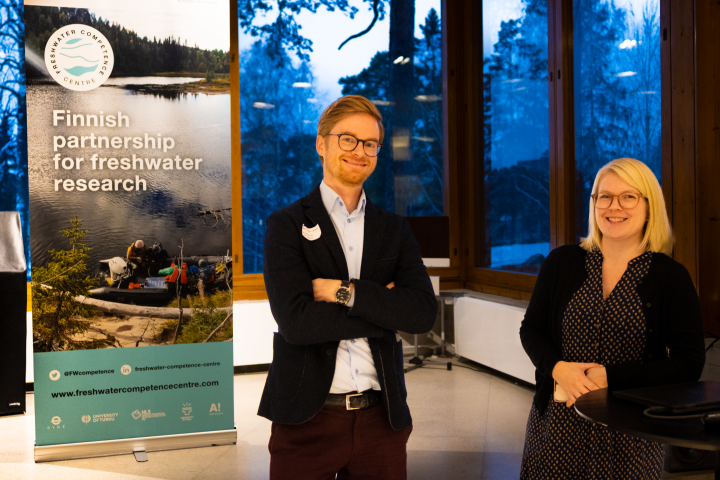Long gone are the days when hydrology science was done with waders, manually operated current meters and water sampling kits. Today’s hydrology is digital twins, autonomous data collection systems and models covering a great variety of environmental and hydrological phenomena.
The Hydrological modellers of Finland gathered at Aalto university in the end of November to discuss the current state and the future of modeling and digitalization of our water resources, in the National Modeling Seminar 2022. The main organizer, Academy research fellow and Assistant Professor Eliisa Lotsari from Aalto university welcomed the guests to the Dipoli building, thanking the hydrological division of Water association of Finland as well as Associate professor Pertti Ala-Aho from Universty of Oulu, who were co-organizing the event.

The talks about environmental and hydrological modeling covered the sea, lakes, rivers as well as the soil both around the watersheds and underwater, agricultural lands and peatlands. The models developed are slowly but surely covering every part of the hydrological system, and even taking into account the seasonal changes that bring an extra challenge to the modeling in Finland. Ice cover effects and seasonal changes are the specialty of Lotsari and her group at Aalto university. The presentations of the day discussed topics such as climate change and hydrological extremes, flooding, ground water, effects of ice cover in rivers.
Digital twins on rivers and lakes
Digital Twin concept was mentioned more than once throughout the day. ”By applying the Digital Twin concept to the natural lake system in the context of urban hydrology, we explore relatively unknown territory”, stated doctoral candidate Aziza Baubekova from University of Oulu, she and her team are aiming to build a Digital Twin of two lakes near Oulu.
Many presenters were part of the new Freshwater Competence Centre that aims to build Digital Twins of three river sites, located in Southern, Central and Northern Finland. The hydrological scientists in Lotsari’s group at Aalto university will play a key role in this, together with universities of Oulu and Turku, SYKE and Finnish Geospatial research Institute FGI. These organizations form the new Academy of Finland FIRI Hydro research infrastructure (HYDRO-RI-Platform) consisting of underwater and aerial drones, unmanned surface vehicles and autonomous sensors such as laser scanners, water quality and soil movement sensors, many of which were presented in the seminar.
Collaboration between research organizations and relevant businesses is the key to the technological development and solutions needed for building digital twins. The second session of the seminar was focusing the collaboration between businesses and academia in this field. The two-year Academy of Finland-funded HYDRO-RDI-Network project had five academic partners and fifteen business partners from the water sector, remote sensing and geoinformatics, developing methods for studying flood risk, river habitats, water quality and sustainable river management. The work carried out in this networking project is continued in the Freshwater Competence Centre.
All the abstracts of the seminar are available at the website of the Water association of Finland

